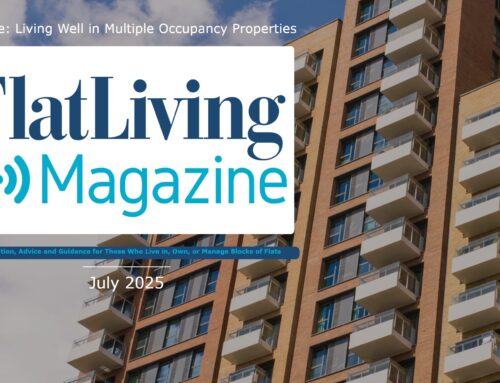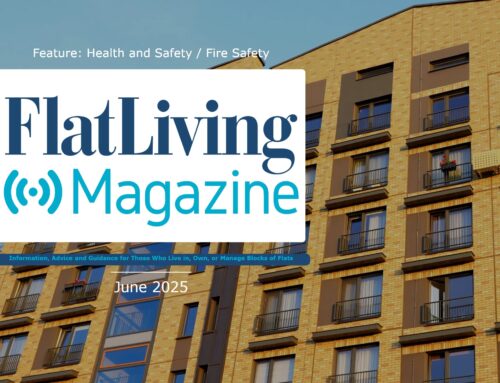Belinda Bagnall from Residentsline looks at the wider role that RMCs can play in creating happy, healthy homes, especially in an age where community, connection and wellbeing are more important than ever.
When we think of a Resident Management Company (RMC), we often focus on the practicalities. Budgeting, maintenance, insurance and repairs are all vital responsibilities. Nevertheless, in truth, RMCs manage much more than buildings. They shape the spaces people call home.
With that comes an allied responsibility: supporting the wellbeing of leaseholders. From the quality of communal spaces to the tone of communication, the actions of an RMC can have a real impact on residents’ day to day experiences and by extension, their wellbeing.
Beyond the Bricks and Mortar
An RMC’s primary role is to ensure the proper running of a residential block of flats. This includes managing service charges, appointing contractors, overseeing building compliance and looking after shared areas. However, every decision made, whether it is about landscaping, lighting or resolving a complaint, affects how residents feel about where they live.
A well-managed building can foster pride, security and trust. A poorly managed one can cause stress, confusion and conflict. This is why managing a building should not only be about ticking boxes. Every decision should also consider the health and happiness of leaseholders.
The Link Between Property Management and Mental Health
While it may not be immediately obvious, the connection between housing and mental health is well established. Feeling safe, respected and involved in one’s home environment contributes to emotional stability and lower stress levels. Unresolved or poorly handled maintenance issues, a lack of transparency or poor neighbour relations can all be sources of huge anxiety and stress.
RMCs can protect leaseholder wellbeing by focusing on three key areas:
- Clear, considerate communication
- Fair and transparent decision making
- Creating opportunities for community engagement
Clear and Considerate Communication
Many disputes and frustrations in residential buildings start with poor communication. Leaseholders may feel confused by service charge decisions or ignored when it comes to their opinions or unsure of how to raise concerns.
This can lead to tension, resentment or even legal disputes all of which can take a toll on mental health. Simple steps such as sending out regular updates via newsletters, a noticeboard or basic emails can help.
Making sure to respond promptly and considerately to any concerns (especially if you know a leaseholder is vulnerable) can make a huge difference.
Transparency around decisions, budgets and future works will create a sense of trust (using jargon free language is especially important here, for the sake of accessibility). Managing expectations around timelines and expenses is also a good way to reduce queries and concerns.
Even if the news is not always positive, residents are more likely to respond calmly if they feel respected and informed.
Fair and Transparent Decision Making
The feeling that decisions are being made behind closed doors or without proper reasoning can create frustration and feelings of exclusion.
RMCs should aim to be:
- Inclusive: Involve residents in surveys, polls or meetings to gather feedback before major decisions.
- Objective: Avoid favouritism or personal bias, especially if disputes arise.
- Accountable: Keep written records of decisions and be ready and willing to explain the reasoning behind them.
- Consistent: Apply rules and policies equally across the board.
When residents trust that decisions are being made fairly and for the good of the whole building, they are more likely to feel secure and valued. This sense of fairness is a foundation for emotional wellbeing in any community.
Community Engagement and Connection
Social connection is a key ingredient in mental wellbeing, yet in many blocks of flats, residents may not know their neighbours. Loneliness and isolation (especially among elderly or remote working leaseholders) can be a real issue.
While it is not necessarily the job of an RMC’s to organise social events, there are simple ways to encourage community spirit. Support resident led initiatives such as book swaps, seasonal gatherings or gardening clubs. Ensure the shared areas of the building are suitable and available for these activities and utilise notice boards or online groups to share information and local news.
Open appropriately structured meetings on a regular basis and at a convenient time for most are a great way to boost communication and encourage friendships. Conflicts often fall away if discussed face to face and a shared sense of control over decisions smooth the way too.
Small efforts to promote friendliness and cooperation can have a big impact. When people feel a sense of belonging, they are more likely to treat their neighbours with kindness and their surroundings with respect.
Final Thoughts
An RMC is not just a management body. It is a cornerstone of the community it serves. By putting resident wellbeing at the centre of their approach, RMCs can do more than maintain buildings, they can help build safe, supportive and emotionally healthy homes.
From reducing conflict through better communication to encouraging small acts of community kindness, RMCs have a unique opportunity to create places where people truly feel at home, not just housed.




Leave A Comment